Josh Lanyon's Blog, page 80
April 13, 2013
Can't Miss TV
In fact, I don't watch a lot of TV, but I do stream a lot of documentaries. Some of the documentaries are for research on a particular project, but sometimes I watch just to spark creativity, get those juices flowing (not THOSE juices, idea juices).
Every so often I'll come across a documentary that really stay with me. That stays in my mind, keeps me thinking, wondering. Even...haunts me.
Here's a couple of them.
If a Tree Falls - I was considering subplots for Winter Kill and I got the idea of eco-terrorists. By the time I finished watching the documentary I was on the side of the eco-terrorists, but maybe that will make for a more interesting and nuanced book.
The Imposter - This was absolutely riveting -- and rather chilling. Stranger on the Shore revolves around a missing child, and I thought this might be useful. And it was very much so -- especially in helping to understand how grieving loved ones can convince themselves of anything. Even when all the evidence points in another direction.
Dreams of a Life - This doesn't tie into anything I'm writing, but wow. Fascinating character study. Depressing too, to be honest. But more fascinating than depressing.
The Weather Underground - This one was for background on Fair Play, the sequel to Fair Game. I'm trying to put the proposal together for Carina Press this month, and it turns out that watching documentaries is easier than writing a synopsis.
You can actually watch The Weather Underground documentary for free right here.
What about you? Watch any good documentaries lately?
Every so often I'll come across a documentary that really stay with me. That stays in my mind, keeps me thinking, wondering. Even...haunts me.
Here's a couple of them.
If a Tree Falls - I was considering subplots for Winter Kill and I got the idea of eco-terrorists. By the time I finished watching the documentary I was on the side of the eco-terrorists, but maybe that will make for a more interesting and nuanced book.
The Imposter - This was absolutely riveting -- and rather chilling. Stranger on the Shore revolves around a missing child, and I thought this might be useful. And it was very much so -- especially in helping to understand how grieving loved ones can convince themselves of anything. Even when all the evidence points in another direction.
Dreams of a Life - This doesn't tie into anything I'm writing, but wow. Fascinating character study. Depressing too, to be honest. But more fascinating than depressing.
The Weather Underground - This one was for background on Fair Play, the sequel to Fair Game. I'm trying to put the proposal together for Carina Press this month, and it turns out that watching documentaries is easier than writing a synopsis.
You can actually watch The Weather Underground documentary for free right here.
What about you? Watch any good documentaries lately?
Published on April 13, 2013 12:55
April 5, 2013
Say it ain't so, ACX!
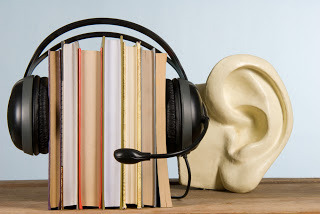 I have a dilemma, and maybe readers and other authors can help me resolve it. Maybe I'm just not looking at the situation from the broader perspective.
I have a dilemma, and maybe readers and other authors can help me resolve it. Maybe I'm just not looking at the situation from the broader perspective.As you know, if you follow this blog or some of the other social media venues where I hang out, I spend a lot of time and energy -- and money -- on adding audio books to my considerable backlist. By the end of this year, I’ll have spent something over $20,000 commissioning audio books through ACX and Audible.com. I'll have a total of 15 audio books, 12 of which I've personally commissioned. I think it’s obvious I believe in audio books and that I think they’re a worthwhile investment for an author or a publishing house. The response from readers has been everything I could have hoped for.
I'm not sure I would have ventured into commissioning audio books had I not discovered ACX. Which is to say, I always planned to have the Adrien English books made into audio, but that's as far as my thinking went. Anyway, ACX is a division of Audible.com (which is owned by – surprise! – Amazon.com). ACX is something new and innovative in audio book production. It's a creation exchange, a sort of go between for rights holders (that would be authors) and audio book producers (narrators/production companies). The finished books are either sold exclusively through Audible, Amazon and iTunes for a 50% royalty rate OR the rights holder declines the exclusive deal and gets a significantly lower royalty rate and has to go through the hassle of listing their work on Amazon and iTunes and other vendors all by their lonesome. You can pay for production outright – which is what I’ve done in all but one case – or you can try to find a producer/narrator to take a royalty share with you (in which case you have no choice but to make your audio book exclusive to ACX/Audible for seven years).
Now for the good news. Despite some growing pains, ACX does exactly what it promises – exactly what you would hope! It’s simple to use and a great way to find and contract quality narrators and producers – especially if you’re paying for production and not asking someone to gamble their time and talent. The books get listed within a few weeks of completing production and royalties are paid monthly. Plus there are “bonuses” for authors who lure new customers to Audible (based on someone signing up for Audible’s subscription service and buying your book as one of their first three purchases). You can also earn a dollar an audio book if you sign up to be an Audible Author -- and now I understand why Audible pays that dollar incentive a book - because the way things are going, most authors won't be earning much beyond that dollar.
Now lest it sound like my problem is audio book sales, no. Not at all. I saw my first two titles earn out within a couple of months of going live, and that was what decided me that ACX and Audible looked like a pretty solid investment. I have every faith that the audio book market is just going to get bigger and better. Accordingly, I committed another ten projects exclusively to ACX and Audible. Like I said, by the end of this year, I’ll have a total of 12 audio books available to readers.
But, alas, I forgot to include Amazon’s quest for world domination into my calculations, and this is where everything gets complicated. Or at least it feels complicated to me, but maybe I'm just not looking at the big picture.
Amazon devised this little thing called “whispersync.” It’s sorta cool, actually.
According to Audible’s website:
Whispersync for Voice is a breakthrough technology that allows you to switch back and forth between reading a Kindle book and listening to the companion Audible audiobook without losing your place. That means you can keep the story going on the books you love, and enjoy more of them. In addition to remembering position, Whispersync for Voice keeps your notes and bookmarks across devices as well.
With Whispersync for Voice you can read on any Kindle or Kindle app and then switch to listening on the Audible app for iPhone or Android and any Kindle Tablet (Kindle Fire HD 8.9", Kindle Fire HD 7", Kindle Fire 2nd Generation, and Kindle Fire 1st Generation) or Kindle E-reader (Kindle Touch and Kindle Keyboard).
So…yeah. Cool. Not essential, but a fun little gimmick. I really never gave it a thought because whispersync is not something I particularly need or want or care about.
I should have given it a thought, though, because it creates a problem for ACX customers, and by ACX's customers, I mean authors and narrators. I mean me. Amazon, in its perennial quest to crush all competition through loss leading, came up with the idea of encouraging readers to try out these whispersynced audio books by knocking the price of audio books down to $1.99 if the (current version) kindle ebook is also purchased.
Now that’s a terrific incentive, no question. Here’s the catch. The author has zero control over the pricing. Although it's communicated as though Audible is doing us a huge favor with this bedrock pricing, they don't allow us to opt in or out. That pricing isn’t isolated to first books in a series or a certain percentage of an author’s backlist. As far as I could ascertain speaking to Audible, it isn’t time limited. It isn’t optional.
And the plan is to make the entire Audible catalog (those books linked to kindle editions, anyway) available through whispersync.
Now, it’s obviously not whispersync, I have an issue with. I’m all for technological advancement – I’m even for pricing incentives. And I guess if my publishers were footing the bill for my audio book production, I wouldn’t mind only making…say, thirty to fifty cents an audio book. I wouldn’t be thrilled, but it wouldn’t be a bad investment. It wouldn’t be costing me money that could have – apparently should have -- been invested elsewhere.
 Yes. Costing me money. Let’s say I’m paying $2000. to produce an audio book, and the first month I sell maybe 100 copies netting around $10.00 each – of which I receive my 50%…so $500. I don’t earn back my production costs. And within the following month or so, the book is whispersynced and now kindle readers can buy the audio book for $1.99. My cut would be half of that.
Yes. Costing me money. Let’s say I’m paying $2000. to produce an audio book, and the first month I sell maybe 100 copies netting around $10.00 each – of which I receive my 50%…so $500. I don’t earn back my production costs. And within the following month or so, the book is whispersynced and now kindle readers can buy the audio book for $1.99. My cut would be half of that. Oh! And if I'm doing a royalty share with a production company, we're each splitting that .99 cents. It's hard to imagine many production companies opting for royalty shares under those terms. And, given those terms, it's hard to see many authors continuing to pay for productions up front when the chances are so slim for the productions earning out in the near future. This is one of the really disappointing bits from my standpoint. If the audio books don’t earn out, I can’t commission more productions.
(Actually, that should probably be the least of my concerns, right?)
Now there are workarounds. An obvious one is don’t commission audio productions through ACX, or if you do commission them through ACX, don’t hand over exclusive marketing rights. That whole 50% royalties thing becomes moot if you can’t control the pricing of the audio books you “own.”
Audible is a little vague about whether they will change pricing on books they don’t control exclusive rights to: At all times we reserve the right to change the price of content as we see fit whether the work is exclusive or nonexclusive to Audible.
Hmm.
I’m guessing they’re still trying to figure that one out.
Another workaround is to add music or additional materials to the audio production. ACX discourages this, but maybe one reason they discourage it is because it makes whispersync harder.
I could hold back the kindle release until the audio book has earned out. Which is to say, I would still release in kindle format, only I would sell kindle format strictly through Smashwords and other vendors until the audio books had earned out.
I could try a kickstarter campaign for particular audio books – Boy With the Painful Tattoo, for example. That way at least I wouldn’t lose money on the deal. But what would I be offering kickstarter contributors? It's not like I can supply them copies of the audio book they've just paid for.
The most obvious workaround is the one I like least, but it's the immediate default position. No more single title works. I’ll only do print collections where there is no corresponding kindle book – as with Armed and Dangerous or In From the Cold. If ACX allowed me the choice of opting into whispersync – or only offered the dirt-cheap pricing for a limited time -- that would be different. I’m not so penny-foolish that I can’t see there aren’t benefits to bundling ebook and audio together, especially on slower selling titles. It’s not having any choice that makes me hostile.

I don't like paying for the privilege of building Audible and Amazon's growing catalog. Is it unreasonable of me to want to earn my investment back?
Personally, I think Amazon's math should give all authors considering producing audio titles through ACX serious pause -- as it should give all narrators serious pause about accepting a royalty share deal (even assuming a stipend is offered, it's unlikely to cover a narrator's production costs). But am I missing something here? Is it worth it to lose money on the front end if I help to build a huge market for audio books and my own significant audio backlist?
I’m not forgetting that I still earn the regular (net) fifty percent on sales at Audible and iTunes (yeah, but let’s not even get into how Audible calculates royalties earned on membership credits). The majority of my audio sales come through Amazon, just like the majority of my ebook sales come through Amazon.
I should also point out that I have nothing against incentive pricing. I read Joe Konrath's blog! But for me, incentive pricing is marking some of my titles down so that more people will try them and then buy the rest of my backlist at its regular price. That way I could, you know, make money. For Amazon, incentive pricing is making audio books so cheap that no other company can compete. Audible and Amazon are not concerned with the financial success of individual authors, and the fact that I’m slamming on the brakes on future audio projects with them is not going to be a concern for them. ACX had a record year last year, and this year looks to surpass those numbers.
Granted, many if not most of the authors flooding in through ACX's gates are unaware of the whispersync pricing. I certainly had no clue, and it took me a couple of months to work out why, though I was adding titles to my audio catalog, my monthly royalties weren't going up. That's right. I've got SEVEN titles live right now, and this month's royalty check was about what I earned the first month I began this venture.
Would Joe Konrath keep publishing through Amazon if Amazon marked all his titles down to .99 cents without his consent?
In fairness, if I was a mega-selling author, this would not be an issue. For one thing, my whispersynced audio books would be priced at $3.95 not $1.99, and I’d be selling thousands of copies the first month, so the audio books would earn out and everything else would be gravy. Tiny spoonfuls of gravy, but gravy nonetheless.
Instead -- like the vast majority of ACX clients -- I’m just your average midlist author working in a niche genre, and I don’t sell thousands of copies in the first month. It’s doubtful I’ll sell more than a thousand copies of any audio book title in the first year.
That said, I’m still a big fan of audio books, and I know that you, my readers, are loving these audio books and asking for more. I will certainly be commissioning more of them in the future -- but right now whether I commission them from ACX (once the current contracts are filled) is in doubt.
But should it be? Am I missing something here? If you were me, would you keep making audio books through ACX? And if so, why?
Published on April 05, 2013 01:00
•
Tags:
acx, audible, audio-books
March 29, 2013
Paul Fleschner on COME UNTO THESE YELLOW SANDS
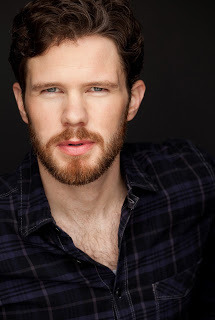 1 - Tell us a little bit about your background. How did you get started in
1 - Tell us a little bit about your background. How did you get started innarrating/producing audio books? How many audio books have you narrated?
I like the sound of the human voice. Not the just the English language, beautiful
as it is, but the whole spectrum of human vocal expressiveness--from Vergil to
grunts and wheezes; from Hemingway to Goodnight, Moon. In fact, it probably
started when I was very young, I remember my mother reading children's poetry
to me from the Childcraft series, and my Dad reading Black Beauty...and there
was real pleasure in listening to a story come alive in the act of reading aloud. I
think most children, if they're lucky, hear a lot of books out loud before they
learn to read themselves. Much later, I had the privilege to study under and
then work with the writer Reynolds Price, and he was a master of reading
aloud...you could tell he really enjoyed it, and was good at it, too. He was
paraplegic and I lived with him for a year to help him get around, and one night
he was very sick and anxious--and he asked me to read to him, and I read the
entirety of To the Lighthouse, and by the end of it he had some peace and
calm, through the experience of listening to Virginia Woolf's luxurious text.
That was my most tangible experience of how reading aloud can be a real
palpable balm to people, it can really ease suffering, when you get right down to
it. I also read a little for my grandma in the nursing home...she loved romance
novels, so that's what it was.
When I was in acting school, one of my teachers told me I should capitalize on
my voice, he really didn't mince words. So that made me think, hey, I should do
audiobooks! I like reading aloud, so why not? And when I started auditioning, I
was blessed to start getting offers. Right now I have nine audiobooks set to be
released in 2013. Four are already complete.
2 - How much acting is involved in narrating a story?
As little as possible. Of course, craft does enter the picture when you have
dialects or a lot of characters to differentiate, for example. But I approach an
audiobook like I am reading a book to a friend, like my best experiences reading
aloud. And if you're reading to a sick person, they don't want to hear you
attempt the world's greatest performance. In fact, I would wager they don't
want to hear you perform at all. So it has to sound kind of effortless. Like
you're just reading! So that's what I try to do. Make it comfortable for the
listener.
Now, if I have to think about how I do this, I would say it comes from a few
things I've heard from other film actors--actors that don't speak the text until
the camera rolls, because that ensures that the words will actually be fresh, the
experience of those words will have a virginity to them, so to speak--very
different from theatrical performance. However, I also think of my
improvisation teacher, and the concept of "yes, and..." to whatever is thrown
out there, so when I'm reading, I just go with it, and enjoy the story as it goes
along, letting it surprise me, hopefully, letting myself be swept away by it, in the
telling of it.
3 - What was the most difficult or challenging aspect of narrating COME UNTO
THESE YELLOW SANDS?
Nothing pops out as being technically hairy territory. Maybe the erotic stuff!
But that's another question. Um, perhaps the dialects--the Irish priest, for
example, sometimes that takes a few goes. Sometimes you have to be extra
careful to differentiate between characters, but not so much that it becomes a
radio play. I mean, I'm not going to sound like a woman, no matter what I do
with my voice, so you just have to imply it, give it the flavor of femininity,
perhaps, it's whatever the part calls for.
With Yellow Sands (as I like to refer to it), the moments I enjoyed the most may
have been the most challenging, the most intimate, the most unknown.
Because what is intimate is essentially what has been unknown prior to that
moment, or unknown in the public sphere. And it's not necessarily the erotic
moments, though it does encompass them...it's anything that is raw, tender,
nervy. And a lot of this book is those things for Swift. So, to my surprise, I
would say that a lot of this book was difficult...because it is a difficult
experience for Swift. He's going through difficult times. He's doubting himself,
he's doubting his partner, he's scared. And the most difficult moment for Swift,
I think, is when he contemplates walking back into the ocean...ending his life,
because he doesn't want to start using again, doesn't want to hurt other people
through his using. That's sad stuff, that's where it's most difficult, and that's
where it's the best, I think. No amount of research or "work" can bring you to
connect with the character in that moment, you just have to reach out your
hand and touch him. It's like being there for someone that needs you. It's
difficult, but it's what makes life worth living.
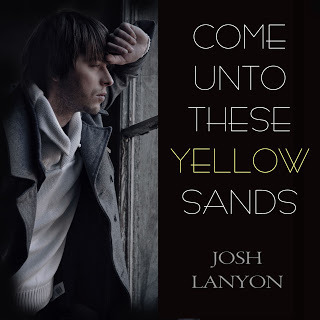 4 - What character was the most fun to narrate? Why?
4 - What character was the most fun to narrate? Why? Swift. I relate to his struggle with substance abuse, his love of language, his
occasionally hot temper--he is very guarded and explosive about his little box of
poems, for example--and I like that. I also, now that I think about it, like his
fascination with Choose Your Own Adventure stories! I loved those too...I had
the entire series of the Lone Wolf books, and they were great! It's those kind
of things that really stretch and stir a young person's imagination, and can lead
to a love of more nuanced writing and literature, as was the case with Swift.
5 - What character was the most difficult to narrate? Why?
Max. Max is a "tough guy", somewhat emotionally repressed in his masculinity.
I mean, he's a great guy, you can tell that about him, but sometimes he's hard
to read. I actually like that. He keeps his cards held close. It's a surprise when
he reveals himself to Swift, it surprised me, actually. I liked that moment, but
up to then, it was hard for me to know what he was thinking, or rather...feeling.
And that may be because a lot of the time, Max doesn't let himself feel deeply,
or doesn't let himself connect with his deep, underlying feelings. He has a job to
do, as police chief. At least, that's how I read it.
6 - Was there a particular scene you think you read especially well? Or that you
particularly enjoyed reading?
Oh, probably the one I just mentioned--when Max reveals himself to Swift. It's a
touching moment, and so important to Swift. To Max too, but it really is about
Swift being impacted by this revelation, the thing he's been waiting for and
hoping for despite his serious doubts. Also, I like the last scene in the book, and
without giving anything away, it's the kind of redemption that Swift really needs
to heal himself. It's such an easy thing to do, but so hard at the same time.
7 - How awkward is it to read erotic scenes aloud?
Well, often I record with an audio engineer sitting in the other room, and you
have to know that he is hearing every single word that is said. So when you're
reading an erotic scene, he is in that moment too. It's the same with a film set-
-you're connecting with another actor, you're in your own little world, but then
there is the mechanism and apparatus of a film set, people looking at a monitor,
through a camera, listening through the sound equipment. Now an audiobook
situation is much less expansive, which makes it more intimate! So it's actually
just me, the text, and the engineer. These erotic scenes call for a heightened
vulnerability, and so you're exposing yourself--literally exposing yourself! as you
read them. I had a class with Austin Pendleton and he helped me to a revelation
that was important to me....vulnerability is just letting the other person have
power over you. Maybe that's obvious to some people, but it wasn't to me, and
in an acting situation, it can be felt tangibly...who has the power. Now, to give
that up is a considerable gift or concession, however you want to look at it.
And these erotic scenes demand, I think, a submission of power! As an actor,
as an individual, I give up my power by totally letting down my guard--or letting
it down as much as I can bear. So if I'm feeling awkward, it's not a bad thing,
it's part of the moment. It's the fig leaf coming down, the face getting red. If
you blush, you're feeling something, good! Feeling is totally unpredictable, but
if it does get awkward in these scenes, I do take that as a good sign...a sign of
entering territory that could be authentic, sincere.
8 - What’s the most satisfying or rewarding part of narrating/producing an
audio book?
Getting paid! Just kidding, but for the working actor, the actor that wants to
make a living at the craft, audiobooks can be more lucrative than a lot of other
forms of acting. Not that it's about the money, because there are million easier
ways to make money than exposing yourself as I just shared. But audiobooks
can be a calculated gamble. You know what you need to break even, to make
money, and so forth...so you can attempt to establish a livelihood that allows
you to keep acting. The name of the game is endurance, or so I've heard. And
as much as I like to read aloud, let's be honest, I'm doing this for an audience, in
the end. And that is to say, I'm doing this to share something, to communicate.
And in the case of audiobooks, I have the privilege of communicating the
author's story. And I take that privilege seriously. I am grateful for it and
humbled by it, the opportunity to share another person's truth, so to speak,
hopefully in a compelling way. I don't want to use the word "dramatic",
because to me it has the whiff of...histrionics, and that kind of acting turns me
off, it's just not my style or taste, though some people love it! What's
satisfying to me is being able to bring my style, my self, fully to the table to
contribute to the author's words. And the two become one. Really, it is that
literal of a merging. And that's an incredible feeling, that union. It's really a
generative union, and it can be life-giving.
9 - Do you ever find yourself wishing the author (naturally not me!!!) hadn’t
taken the story in a particular direction? Or is narrating a much more detached
process?
I wouldn't say it's a totally detached process, though there is a level of
detachment, and a level of a healthy attachment, too. I mean, you've
committed to do the book, you want it to be good, you want it to be a real
compelling story, that will sure make it easier to spend the time in front of the
microphone! And of course if it's consistently compelling, it's more likely to
reach more people. At the same time, when I am committed to a book, I try to
not actively question anything the writer does. I have to believe it. Maybe that
essential belief can be equated with the "yes, and..." improvisation concept I
mentioned, that you just go with it no matter what the author does, there's
really no use dwelling over spilled milk or sour grapes or whatever the
expression is...what's the point? The text is the text, read it. It's like the
detachment of a good sommelier, I may be passionate about my product, but
with deference to the product itself and the customer. In other words, my
performance should never get in the way of telling the story, of pouring the
wine, so to speak. That's the service that is being offered, the telling of the
story.
10 - Where can readers/listeners find out more about you and your work?
www.paulfleschner.com
**Note** Paul also has a new Facebook page.
Go, go, go! and check back for more updates, there are more good books on
the way...
Published on March 29, 2013 01:00
March 26, 2013
THE RETURN OF DABWAHA!
They said it couldn't happen. They said we were toast. Ham and cheese on rye, I believe. But YOU showed them how wrong they were. How a side of nuts and a handful of chips could make all the difference to lunchtime. And the war against tyranny.
I don't know. Something like that.
Anyway, Round THREE of the Dabwaha and we're still here. This time we're up against the Red Queen herself, Abi Roux, who sums it up thusly.
All we can do is...our damnedest. The voting begins Midnight on Thursday (which some of you may think of as still Wednesday) and runs till Thursday noon. You vote here and you vote often. With as many IP addresses as you have time and energy and arcane computer skilz.
And to encourage the madness, here's the coat of arms devised by those shrewd and canny elves at Blind Eye Books. If that doesn't inspire you, well, I can't imagine what would.
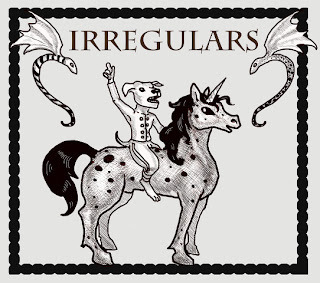
I don't know. Something like that.
Anyway, Round THREE of the Dabwaha and we're still here. This time we're up against the Red Queen herself, Abi Roux, who sums it up thusly.
All we can do is...our damnedest. The voting begins Midnight on Thursday (which some of you may think of as still Wednesday) and runs till Thursday noon. You vote here and you vote often. With as many IP addresses as you have time and energy and arcane computer skilz.
And to encourage the madness, here's the coat of arms devised by those shrewd and canny elves at Blind Eye Books. If that doesn't inspire you, well, I can't imagine what would.

Published on March 26, 2013 09:11
March 23, 2013
Baby, I Need You Now!
The Irregulars anthology squares off against Riptide Publishing in Round 2 of the Zippety Dabwaha Death Match 3000!!!
But I know you don't want rhetoric and shameless appeals to emotion. So here is a list of hard, cold facts as to why you should be voting for Ginn Hale, Nicole Kimberling, Astrid Amara, and yours truly.
See the video here.
And THEN you can pop over here and vote. You don't even have to register. You can vote on every electronic device in the house! In fact, we NEED you to vote on every electronic device in the house. This is going to be an uphill battle.
Think of us. The gallant RAF battling against the brutal Luftwaffe.
But I know you don't want rhetoric and shameless appeals to emotion. So here is a list of hard, cold facts as to why you should be voting for Ginn Hale, Nicole Kimberling, Astrid Amara, and yours truly.
See the video here.
And THEN you can pop over here and vote. You don't even have to register. You can vote on every electronic device in the house! In fact, we NEED you to vote on every electronic device in the house. This is going to be an uphill battle.
Think of us. The gallant RAF battling against the brutal Luftwaffe.
Published on March 23, 2013 10:46
March 22, 2013
Character Interview #1 - Jeff and Austin from A VINTAGE AFFAIR
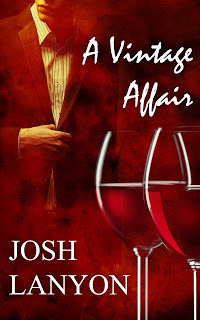 I see them walk into the Magnolia Room, the bar at the Stonewall Jackson Inn where they first really started to get to know each other. Austin is talking, Jeff is listening, smiling faintly, his gaze taking in the nearly empty room. He spots me, touches Austin’s elbow. Austinbreaks off what he was saying, looking a little wary.
I see them walk into the Magnolia Room, the bar at the Stonewall Jackson Inn where they first really started to get to know each other. Austin is talking, Jeff is listening, smiling faintly, his gaze taking in the nearly empty room. He spots me, touches Austin’s elbow. Austinbreaks off what he was saying, looking a little wary. For some reason I always think of Austinas blond, but it’s Jeff who is blond. Austinhas dark hair and the boyishly pouty, unthreateningly exotic looks you’d expect of a Calvin Klein underwear model – though he’s not remotely the pouty type and his modeling days are long behind him. Jeff has a more straightforward handsomeness. Those all American good looks that effectively sell so many pick up trucks and pairs of Levis.
“Red or white?” Jeff asks and Austinshakes his head, amused.
“Surprise me.”
Jeff goes to the bar and Austincomes over to the table to greet me. We get the preliminaries out of the way, and I ask, “Does he often?”
Austin is still smiling, still wary. “Does he what?”
“Surprise you?”
He relaxes a fraction. “Yes. As a matter of fact, he does.” The look he throws Jeff, now busily charming the lady bartender, is affectionate.
“So how are things going? Where are you living now?”
Austin tunes back in. “We’ve been doing the long distance thing, but as of last weekend…” he expels a long breath, “we’re homeowners. We bought a house in Buckhead.” His smile is happy, even content.
“So you’re relocating to Georgia?” I admit that’s a surprise. I thought it was more likely they’d move north.
“It’s easier for me to relocate than Jeff. He’s got contacts here, both in law enforcement and the community. It would take him years to build that network up again. Whereas I can work from home a lot of the time.” He shrugs.
“But you’re not living in Madison?”
“No.” There’s a pause before he adds, “Buckhead gives us both a little breathing room.”
Jeff rejoins us. He sets a glass of white wine in front of Austin. “Muscadine Supreme. From GeorgiaWinery.”
 Austin makes a hm sound and gently swirls the wine to release the bouquet. We watch as he sniffs the glass thoughtfully. He hms again and Jeff smiles faintly, tolerantly. He’s drinking beer which he raises toward me in greeting.
Austin makes a hm sound and gently swirls the wine to release the bouquet. We watch as he sniffs the glass thoughtfully. He hms again and Jeff smiles faintly, tolerantly. He’s drinking beer which he raises toward me in greeting. We wait as Austintilts the wine glass and checks the color. Finally he takes a sip. He considers.
“So you’re still in the PI business, Jeff?” I ask as Austintakes his iPhone out and makes notes.
Jeff nods.
“How’s that pay?”
“Enough.”
Of course, they’re not hurting for money. Austininherited a bundle when Harrison passed away.
“Have you solved any more mysteries?”
Jeff says briefly, “Every day.” Austinlooks up at that he and Jeff exchange funny little half-smiles. Private smiles.
“What are you doing now, Austin?”
Austin’s face gets that closed look again. Guarded. “Writing mostly. Exploring the possibilities.”
“Like?”
“He’s had a lot of offers,” Jeff says. “Anybody’d be lucky to have him.”
Austin grimaces.
“I think he ought to open his own winery,” Jeff says.
“It’s not that easy, Jeff. It’s not just about money or even land.”
“You could do it.”
Austin is shaking his head.
“How’s Ernest?” I ask, since that seems like a safe topic.
Jeff chokes on his beer. Austinbites his lip and tries not to laugh. He answers, “Ernest is building a rocket.”
“His second rocket,” Jeff says. “The first one blew up.”
“Do you see much of him?”
Austin says, “He’s at school right now. But I try to see him every couple of weekends.”
“What does Ernest think of Jeff?”
Jeff says gravely, imitating Ernest’s adult-sounding tone, “An interesting specimen, Austin.”
Austin laughs. “He didn’t say that. Not exactly.”
When Jeff chuckles, his eyes crinkle. He drinks his beer and doesn’t bother to argue.
“What do the assorted and various stepmothers thinks of you two getting together?”
“Assorted and various things,” Jeff drawls.
Austin smiles faintly, watching him.
“Do you ever see the Cashels?”
“Naw,” says Jeff.
“I met Cormac for lunch when he came to New York to meet his publisher.”
“That was your good deed for the year,” Jeff responds.
“He’s okay.” Austinshrugs dismissingly.
I say, “You know, a lot of readers thought you two wouldn’t last.”
“Us?” Austinseems genuinely startled.
Jeff’s mouth twists, but he doesn’t say anything. He seems more interested in Austin’s response.
“What’s been the biggest challenge for you?”
Austin’s brows draw together as he considers. Jeff answers that one. “Trying to make it work long distance. Plus Austin travels a lot. This winter he was backpacking for a month in South America. I think I heard from him a total of three times. I had no idea if he was alive or dead.”
Austin makes a pained face. “You’d probably hear if I was dead.”
“That makes me feel a whole helluva lot better.”
I interrupt, “What’s the most fun about being together?”
“All of it,” Austinsays.
Jeff meets his direct gaze unhesitatingly. “Yeah, no matter how much time we spend together, it’s not enough. So we’re buying this house onChatham Road.”
“Chinese wallpaper in the dining room,” Austinsays. Apparently that’s a good thing.
“What do you fight about?”
“Chinese wallpaper?” Jeff suggests.
“We don’t really fight,” Austin says.
Jeff states, “We disagreeover Austin’s notion that it’s okay to veer from his itinerary without letting anyone know, and that it doesn’t matter if he forgets to check in for a week.”
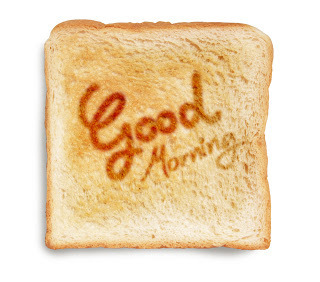 Austin expels a long breath but doesn’t argue. They’ve been over this ground once or twice. He says, “Nobody has ever shot at mewhen I’m working.”
Austin expels a long breath but doesn’t argue. They’ve been over this ground once or twice. He says, “Nobody has ever shot at mewhen I’m working.” Jeff opens his mouth. I interrupt, “What have you each learned from the other?”
Austin says, “To phone home regularly.”
Jeff laughs. He says, “That the right person makes a difference.”
“To what?”
“To everything.”
“He means sex.” Austinis teasing Jeff. Jeff looks mildly uncomfortable, but that’s not the surprise. The surprise is that Austin is so relaxed that he can joke about something that was surely painful to remember at one time.
Jeff says almost stubbornly, “I mean everything.”
Their gazes hold briefly. Austininclines his head as though acknowledging a point.
“What do you laugh about?”
Jeff says confidentially, “Well, when Austingets excited he has this little trick—”
“Jeff.”
Jeff laughs.
“Bastard,” Austin says without heat. Jeff is still laughing, and after a moment Austin joins in.
Which answers that question – and probably all the rest of them.
Published on March 22, 2013 01:00
•
Tags:
a-vintage-affair, josh-lanyon
March 18, 2013
Winner of the Armed and Dangerous Narrator Contest
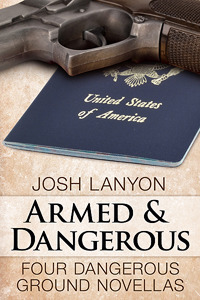 Congratulations to Adrian Bisson!
Congratulations to Adrian Bisson! Adrian -- also known as #5 in the first go-round and #1 in the second round -- was the two-time hands down winner in our quest to find the narrator of Armed and Dangerous. I'm delighted to announce he's graciously accepted the offer to produce and narrate the collection of Dangerous Ground novellas.
Thank you again to all our talented competitors. And more thanks to all of you readers who took the time (and so much care) to vote. You made my job a lot easier!
Published on March 18, 2013 01:00
March 17, 2013
Happy St. Paddy's!
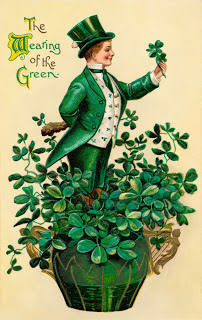 In honor of the day -- and all me Irish relations, past and present -- I'm wishing you a Happy St. Paddy's.
In honor of the day -- and all me Irish relations, past and present -- I'm wishing you a Happy St. Paddy's. Today only, the short story "In Sunshine or In Shadow" is free (in all formats) through Smashwords using this coupon code: KL36D
And, in the words of the poet (well, the playwright), "All the world's a stage and most of us are desperately unrehearsed."
- Sean O'Casey
Published on March 17, 2013 09:44
March 16, 2013
We have a winner!
 But I'm not going to make the announcement on who will be narrating Armed and Dangerous until Monday. I'll just say that I'm content with the way things worked out. Of course I thought all three finalist narrators were terrific, so from my perspective, there was no way things were going to turn out anything but great.
But I'm not going to make the announcement on who will be narrating Armed and Dangerous until Monday. I'll just say that I'm content with the way things worked out. Of course I thought all three finalist narrators were terrific, so from my perspective, there was no way things were going to turn out anything but great. That said, given how really excellent these guys were, I want to recommend them to any author or publisher thinking of commissioning an audio book. I'm already looking at future projects and considering where I might use them.
So...in no particular order our finalists were:
Jordan Murphy
Adrian Bisson
Michael Ochs for Brick Shop Audio
All three of these guys were professionals, good sports -- and have GREAT voices. In fact, I have never read so many emails from readers saying they wanted to "lick their computer screens"!
Speaking of which, I want to thank all the readers who took part in the voting process. We had about two hundred votes each time, which is really excellent. I don't know if you were just humoring me or you really were that invested in who narrates Will and Taylor's stories, but it really made the process a lot of fun.
So a big thank you to the readers and to our very talented narrators.
Published on March 16, 2013 13:10
March 15, 2013
Do You Need an Agent?
 I was reading an article on Sterling Lord's Lord of Publishing: A Memoir. Lord, of course is that Sterling Lord. The legendary literary agent. Lord was discussing how the industry has changed and how literary representation has changed. He was...not scathing exactly, but when he started out in publishing, it wasn't the numbers-driven industry it is now. So obviously there has been a shift or two since the old days, and agenting is one of the things that has shifted the most. There just isn't a more endangered animal in publishing than the literary agent. But it's still too early to say how this is all going to shake out. Agents seem to be reinventing themselves, some of them taking on roles of managers and publicists and editors. Evolution, I guess.
I was reading an article on Sterling Lord's Lord of Publishing: A Memoir. Lord, of course is that Sterling Lord. The legendary literary agent. Lord was discussing how the industry has changed and how literary representation has changed. He was...not scathing exactly, but when he started out in publishing, it wasn't the numbers-driven industry it is now. So obviously there has been a shift or two since the old days, and agenting is one of the things that has shifted the most. There just isn't a more endangered animal in publishing than the literary agent. But it's still too early to say how this is all going to shake out. Agents seem to be reinventing themselves, some of them taking on roles of managers and publicists and editors. Evolution, I guess.Anyway, there’s been a fair bit of discussion in our genre lately on this topic. So I thought, as someone who has done it both ways (er, that would be publishing) I’d offer my ten cents on the question.
Do you need an agent? Short answer? If you’re writing m/m fiction, probably not. Not just yet, anyway.
Long answer? See below.
Basically you need an agent for two reasons that remain unchanging. To open doors that are otherwise closed to you. And to negotiate better, smarter deals than you could get on your own.
Actually, you can add a third very good reason for partnering up with an agent: The agent sees the big picture and has a plan for how to help you reach your career goals. I don't think Sterling Lord and his ilk did a lot of career planning back in the day, so that's a newer development.
Reasons NOT to get an agent: the agent is opening her own publishing house and/or you think having an agent gives you credibility and clout.
An agent starting up her own publishing business is an agent who sees the writing on the wall. Most money in publishing is not made by authors – nor, especially now – agents. On one level it makes sense for an agent to open a publishing house. Heck, everyone else is doing it, and at least plenty of agents have worked in publishing houses and have practical ideas of how publishing operates. Also, often agents can see the commercial possibilities of a work that they just can’t sell to a publishing house. So the agent will publish the promising but unsaleable book and both author and agent will profit.
I’m not saying this is always a bad plan, I’m saying there is a potential and dangerous conflict of interest, which may or may not come into play.
As for the clout and credibility… Even seven years ago, that was still true. Now? Now it depends on the particular agent – and the particular doors he can open for you. You do not need an agent who can get you a contract with Dreamspinner Press. An agent who can sell your male-male romance to HQN. Yeah. That’s probably the agent you want.
So let’s consider good reasons to get an agent even if you are just planning to write male- male romance for the rest of your career.
 Opening doors that are otherwise closed to you. Let’s say that hithertofore you’ve been publishing with Schnooky-Nooky Press and you’re hoping, for starters, to break into one of the bigger epubs. You figure if your submission is agented, you’ll get a closer read. Maybe even a priority read. This is quite possible. Having an agent means someone besides you is willing to invest in your career, and that does count for something. Plus, your agent may have already done a lot of the ground work by asking for revisions and edits on your manuscript before she ever agreed to take it on. That could be very helpful to you, again, depending on the agent.
Opening doors that are otherwise closed to you. Let’s say that hithertofore you’ve been publishing with Schnooky-Nooky Press and you’re hoping, for starters, to break into one of the bigger epubs. You figure if your submission is agented, you’ll get a closer read. Maybe even a priority read. This is quite possible. Having an agent means someone besides you is willing to invest in your career, and that does count for something. Plus, your agent may have already done a lot of the ground work by asking for revisions and edits on your manuscript before she ever agreed to take it on. That could be very helpful to you, again, depending on the agent. Or this scenario. You’re hoping to move up the publishing food chain and maybe place your work with a major player publisher. Unless we’re talking Harlequin and a few other romance publishers, yes, you absolutely need an agent. No question. The catch here is that agents operate – as so much of publishing does – based on relationships. Access to HarperCollins does not occur simply by virtue of being an agent. You really want to look at who your prospective agent represents -- and where he’s selling their work.
To negotiate better, smarter deals than you could get on your own. Lest it sound like I am anti-agent, I am grateful at least once a month for the negotiating my own agent did on my behalf with legacy publishers. Thanks to my agent (and only to my agent -- because none of this would have occurred to me at that time) I still own my audio rights and – more importantly – my work is not being held forever by a publisher who has successfully argued in other cases that, even though ebooks barely existed at the time I signed contracts, putting a book into POD or digital form = still in print.
Thank you, Agent Lady, wherever you are. You saved me from making costly and painful mistakes. Not that I would have had the opportunity to make those mistakes since I wouldn’t have got my foot in those doors without your help. So thank you again.
That said, it’s hard to go too wrong in epublishing provided you exert a little commonsense. Oh, and watch and listen to what’s going on with authors around you. If you’ve got long range writing career plans, you need to educate yourself in your field, and that includes having a basic grasp of the rights you should not blithely hand over.
And even if you do sign a not-so-favorable contract (as I have done a couple of times since I swanned out on my own) the ramifications don’t tend to be lasting. It’s an ill wind that blows no good, and I can say that (in this particular genre) even contracts that I regretted, have almost always, in the end, worked in my favor. Or at least not done me any serious and lasting harm.
Could an agent keep you from signing a bad contract? Yes. Absolutely. So could a lawyer. You could always consider joining the Author’s Guild, which provides free legal advice for members.
Can an agent get you a better deal when most of the epubs and indies we deal with are working from boiler plate contracts? Maybe. Probably? It depends on how you define (and price) “better.” Are more author copies or shaving a year off a lengthy contract worth $23,000. to you? It’s not a rhetorical question. If you’re earning 100K+ thanks to the efforts of your agent, yes, I would think that was worth it to you.
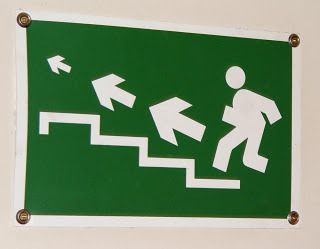 The agent sees the big picture and has a plan for how to help you get to your career goals. Now and again I hear authors saying things like why should an agent get 15% of my hard work? The theory is an agent is worth every penny of her commission because you’re earning more than you would earn without her. That’s the idea. The idea is that the agent brings opportunity and possibility to the table. But opportunity and possibility aren’t solely about the editors she has lunch with. An agent’s success also has to do with how educated and knowledgeable she is about the industry in general – and her understanding of the best way to apply that know-how to your particular situation. Agents stay relevant and indispensable in the new publishing climate when they are as invested in your success as you are. You don’t want an agent who is essentially running an author mill and relying on volume to stay afloat. You want someone helping you make the right decisions. Both in the short term and for the long term. You want someone with an eye on the future – maybe even with a theory of what the future is going to look like for both of you.
The agent sees the big picture and has a plan for how to help you get to your career goals. Now and again I hear authors saying things like why should an agent get 15% of my hard work? The theory is an agent is worth every penny of her commission because you’re earning more than you would earn without her. That’s the idea. The idea is that the agent brings opportunity and possibility to the table. But opportunity and possibility aren’t solely about the editors she has lunch with. An agent’s success also has to do with how educated and knowledgeable she is about the industry in general – and her understanding of the best way to apply that know-how to your particular situation. Agents stay relevant and indispensable in the new publishing climate when they are as invested in your success as you are. You don’t want an agent who is essentially running an author mill and relying on volume to stay afloat. You want someone helping you make the right decisions. Both in the short term and for the long term. You want someone with an eye on the future – maybe even with a theory of what the future is going to look like for both of you. So…do you need an agent? The answer to that question is dependent on two things. Where you are in your career right now, and where you want to be in five years. You have to be honest in your assessment. As far as where you are right now—usually the answer is not where I want to be. As for what you want in the future? Do you want complete artistic control of your work? You don’t need an agent. Do you want to earn a lot of money from publishing your stories? Again, you don’t need an agent. Do you want access to mainstream publishers as they slowly, creakily open the doors to male-male romance? If you hope to take your career mainstream, then yes, you probably will need an agent. Just remember that “writing mainstream” is about more than having an agent represent you to big publishers. Nor does writing mainstream guarantee success – depending on how you define “success.” A definition you need to give thought to.
That, however, is a topic for another day.
Published on March 15, 2013 01:00



